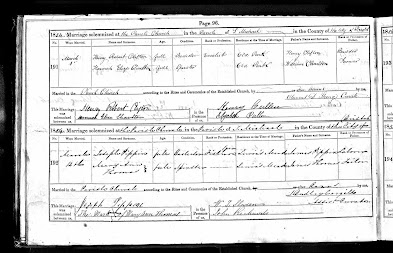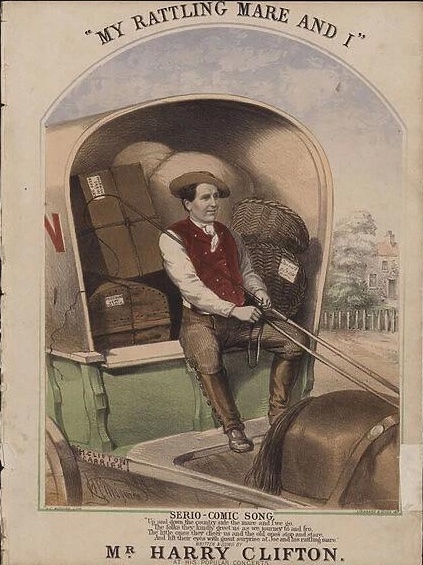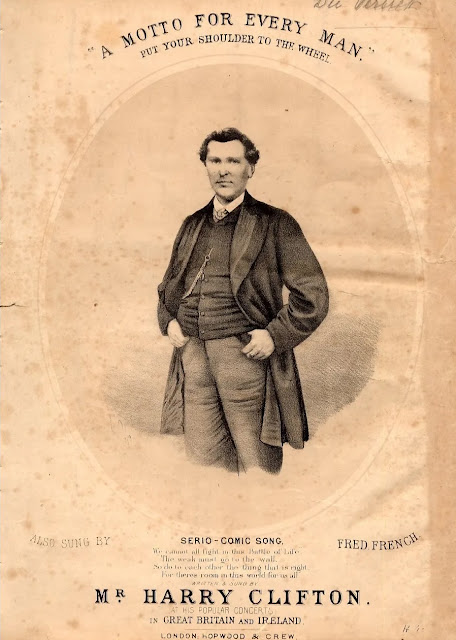Writing this article wasn't among the top hundred of the jobs on my 'to-do' list. Harry Clifton (comic vocalist and writer) has really only come into my orbit, in the past, through his last de facto 'wife', the splendid comic opera contralto, Fanny Edwards.
However. Yesterday I came upon one of his songs, and I remembered that I'd been squirreling such items away in a Dropbox folder for years .. So, I thought I'd pop into Google and see if he'd been already 'done' by some worthwhile source. 'Worthwhile' was the key word. Yes, Wikiplegia has a small piece on him. A few familiar facts and a whole lot of fuzzy stuff. And, what? Not even a birthdate!
That's easily fixed. Henry Robert CLIFTON was born in Hoddesdon, Broxbourne, Hertfordshire on 20 April 1832. His father, Henry Clifton was a builder and carpenter, his mother was Harriet or Harriot née Hollingsworth. They had been married 29 April 1828 in Southwark.
Henry sr died in 1838, and Harriet and her 9 year-old son can be seen in a lodging house in Hoddesdon High Street, in the 1841 census. She is listed as 30 and independent. Really? So she would have been 17 at her marriage? Not impossible, but such a fact is usually recorded on the banns. And Harry was actually 8.
So, what next. Wiki tells us Harry was orphaned. A very peculiar bunch of Family Historians (Harry had no surviving issue), can't agree as to whether Harriet died in 1843(ish) in ?Battersea, or in 1864 in Watford. An entry for Harry in the 1851 census would be helpful (with or, probably, without mother), but I can't find one. Wiki squirms out by saying 'little is known of his early adulthood'. I'm still searching, but by 1851, aged 18, he was probably already an entertainer. In 1853 he advertised his 'third annual Benefit'.
My first sighting of the boy is at Herbert Hudson's Concert Room, pendant to the King's Head public house in Digbeth, Birmingham. 'Vocal and dramatic entertainment every evening, free admission'. So, I imagine, no pay or er ... liquid pay! Mr Hudson, also a comic singer, went on to run the Spread Eagle Concert Hall in Spiceal Street, and the Midland Counties Concert Hall in the Bull Ring, before his death, on 7 April 1858. But Harry was now on his way. He took the Railway Saloon in Chatham High Street for a couple of months...
OK. Late of the Manchester, Birmingham and Liverpool concerts. I have to search some more! 28 October he took himself a Benefit, and then ...
My next sighting is in Bristol at Easter 1854. Entry Free again. Pendant to a pub? Did this happen? We know he was in Bristol ...
Anyway, by August he was appearing in Cheltenham and Birmingham in variety programmes. Not very high-class ones (I only know of Charley Buckingham's dogs and a Mlle Cerito), but there were fireworks
And there was something else. Miss Annie Charlton. Hannah Eliza Charlton. Mrs Harry Clifton. The couple had been married during that time in Bristol (1 March 1854).
This is the only evidence I have of Annie being a performer. Alas, she would not be for long. The young Mrs Clifton died on a date on which the Family Historians cannot agree. It was, however, surely before 1857, when Harry embarked on a disastrous second marriage.
In 1855, I spot him at Mr John Balmbra's Music Saloon, at the Wheatsheaf Inn, in Newcastle, but, more importantly in his first visit to Ireland. He appeared at the Shakspere (sic) Concert Hall in Belfast and, for the first of what would be many, many appearances at Jude's Concert Hall, pendant to Mr Jude's 'Royal Hotel, Tavern and Coffee Rooms', at Dublin's 12/13 Grafton Street. 'Mr H R Clifton from the principal London Concerts'. He is reported to have sung 'Russo-Turkish songs' (the countries were at war).
Nota Bene: at this time a Mr H Clifton, wife and daughter little Blanche put in an appearance in the London halls doing comic songs, duets et al. Latterly father billed himself as J H Clifton. Blanche, it seems, went to Australia, became Mrs Frank Hussey, and got out of our hair. This Mr Clifton seems to have been, some years previously, manager of Wolverhampton's Staffordshire Knot Music Hall. He's not our Harry.
In 1856, our man is at Blackheath, Rendall's Concert Hall, Portsea, Woolwich ('an old favourite'!), before he and his 'clever songs on passing events' again returned to Dublin. There he shared a bill, notably, with Mary Ann Lawrence, the future 'Millie Cavendish' of New York's Black Crook. 1857 sees him -- when not in Dublin -- at the London Supper Rooms in Manchester's Bridge Street. And it appears that it was now that he took employ at Evans's Supper Rooms. And committed the folly of his life. The new wife was 19 year-old Mary Ann Terry from Birmingham (b 18 March 1838).

And here we meet a piece of fake history. The Family Historians have mistaken their Mary Ann and chosen to ally themselves and their ancestors to a lass from Leeds who was someone else altogether! Perhaps this is where the extraneous children come from. This terrible Mary Ann, who was to be the bane of Harry's life, was one of the children of Birmingham coach-harness plater and wire worker John Terry and his wife Louisa. They can be seen in the 1851 census: parents, John, Mary Ann, Alfred, Walter, Andrew, Daniel, Rosannah, Rhoda.
Anyway, when Harry sued for judicial separation after 7 years of married non-bliss, he listed the details of his wife's perpetual drunkenness, her physical attacks on him ... and his list included no children. I assume he got his judicial separation, they subsequently 'lived apart', but he was not yet rid of Mary Ann. When he died, leaving his fortune of some £6,000 to his current partner, she rose up like Frumah Sarah to challenge the will. I hope she didn't succeed.
I see him at the Birmingham Concert Hall, at Wilton's Music Hall, at the Glasgow Whitebait Rooms ('old favourite'), Sheffield's Surrey Music Hall, Westbar, the Belfast Imperial Colosseum, and more and more at Jude's in Dublin. And now, songtitles begin to be mentioned more freely: 'Jack Jenkins', 'The School Boy', the topical 'Galway/Lever Line', 'Out for the Night', Ambrose Maynard's new song on the Elections, Harry Sydney's 'The Old Frieze Coat', 'Pat of Mullingar', 'Dublin Rhymes', 'Meandering Mulligan', 'Reform', 'The Drogheda Trip', his Shakespearian burlesque songs ... 'he has a new song nearly every night' commented the Dublin press, as he passed 200, 250, 300 nights on the bill at Jude's.
1860 included further dates at Holder's in Birmingham, the Canterbury Hall in Salford, the Knightsbridge Music Hall, and in Scotland where his extempore and impromptu songs went down a treat ('Local Events') and he appeared regularly in the Temperance Society Saturday Nights in Glasgow alongside prima donna Pauline Vaneri and local balladeer, Helen Kirk.
In 1861, he was engaged at the Queen's Theatre in Dublin, where he made an unusual appearance as an actor (Jacob Twig in Black-Eyed Susan) and gave his 'new entertainment', before moving to Jude's for a season, then back to Glasgow .. and, after '20 months in Ireland and Scotland', came to London and engagements at the Knightbridge, the Marylebone. 'The Dark Girl dressed in Blue' proved his song of the season
 |
| American edition ... Harry doesn't make the cover |
At Christmas he was back in Scotland with his hit song, plus 'Uncle Joe', 'Obadiah Oh!', and a 'new, quaint and original' song titled 'Paddington Green'. As 'Polly Perkins of Paddington Green' it would give him another durable success.
Harry had by now formed a profitable alliance with the music publishers Hopwood and Crew, as a result of which high-class editions of his flood of new songs were published, and over the years a vast list emerged.
In the same month of June 1863 in which 'Paddington Green' was published, Harry supplied another winner in 'Isabella, the Barber's Daughter', followed by 'Poor Old Mike', 'Water Cresses' ... and still they kept coming. Hundreds and hundreds, of which a regular quota became favourites for a shorter or longer time.

Harry's regular London dates, at this time, may not have been at the classiest music-halls -- the Knightsbridge, the Marylebone, Wilton's, the Middlesex were not top houses -- but back in Scotland he was the number one. And to Scotland he duly went with his homemade songs, the best of other folks' songs, and plenty of local references, and the topical lyrics which went down so well. The Prince of Wales got wed, Harry brought out 'The Prince of Wales's Wedding', when the Pepper's Ghost Illusion became the rage, Harry advertised his own Ghost ('Have you seen the Ghost?'), at Christmas time he sang of 'The Past Year' while never neglecting his Oirishisms ('Ireland's Gem', 'Paddy's Wedding') or his tales of bad luck in love ('Blighted Affection', 'The Milkman'), not to forget his ration of extempore songs, and society pictures ('The Concert Room') and, above all, the 'motto songs' -- comical homilies or cautionary tales ... it was endless!

In 1864, he was seen at the Pavilion, the Regent, Sam Collins's ('The Commercial Man or Sold Again', The Weeping Willer' etc) and even gave a concert back in his native Herfordshire (Hertford Corn Exchange 25 October 1864), but the event of 1864 was undoubtedly his liberation from Mary Ann.
Now his private life could take the same upward elan as his public one. With a little help from Hopwood and Crew. And their promotion not only of his new songs ('The Mail Train', 'The Calico Printer's Clerk', 'Darby Maguire', 'The Good Tempered Man'), but of a new venture. 25 April 1865 marked the appearance of Harry's Hopwood and Crew-backed 'Star Concert Party'. A manna for Harry, who had recently lost his savings in a Birmingham bank failure.

The 'Star Concert Party' comprised Harry, three vocalists -- Frank Sadlier (tenor), Bessie Aitken (soprano) and Fanny Edwards (contralto) -- and a pianist, Mr David Williams. Nothing very novel. All three vocalists were well-enough known in Scotland. Mr Sadlier (or Sadleir) from Leeds was an adequate baritenor who spent a dozen years on the northern music-hall circuits, Miss Aitken (Mrs Billing) was a fine and experienced young singer, dubbed 'the Queen of Scottish Ballad Vocalists' through a quarter of a century of career, and Fanny too had, at this stage, been on the Scottish circuits for several years. The composition of the party would soon change, but Harry and Fanny were its backbone -- and a couple -- from now until his death.
During that time, Fanny's younger sister, Hannah Edwards (ka Annie KINNAIRD) became the soprano of the group, and married the party's latest tenor [Jacob] Redfern HOLLINS ... whose history is worthy a whole article to itself (yes, I've written it!) ...
Hollins, of course, became celebrated as the original tenor of George Edwardes's production of Dorothy.
Fanny went on to become a top comic opera contralto and the exploits of her later career, and those of her family, largely in America, I've covered elsewhere.
The last seven years of Harry's life were, visibly, the most successful and the happiest. Alas, they years were only seven. At the age of just forty, he succumbed to dropsy, at Shepherds Bush, amid the Edwards family, on 15 July 1872.
I hav'n't attempted to follow him through those last seven years chronologically. His popularity well and truly established, the concert party dates followed one upon the other, the new songs followed ten upon the other, and they remain as his monument, some even dubbed in modern times as 'folk songs', and played as such, a century and a half on. Here's a bill from 1868. And, see ... Apart from the established 'Fifty Years Ago', and his duet with Fanny, Harry doesn't let on what he's going to sing ...
I am not going to try to list our man's published songs. Though someone ought to. I am not going to try to precisely date all of them. Although it may be possible. At various times (see above) there were put out lists of those in print ...
So these all pre-date August 1866.
Just a few more, which I happen to have to hand ...





and the last ...
Enough. There must be loads of Harryphemera around in England, Scotland and Ireland ... but I am in New Zealand. Anyone who can add, please do. But at least some of the facts have been put right.
PS Wiki, I have found no reference in the thousand press reports on Harry to his being known as 'Handsome Harry'. The references to his married life are already debunked.
PPS Family historians? Start over, with the right wife.
PPPS me. I reckon I deserve a whisky or three. (Done!)















































Hi there, A great article thank you for putting this together, I have been researching Harry Clifton for a play I'm writing and it is nice to see a lot of the information confirmed that I have researched, because as you say there are a lot of fuzzy facts out there. You mentioned an article on Redfern Hollins, I tried to find this on your website but couldn't, I would love to read this if you could point me in the right direction?
ReplyDeleteAlso this is a bit of a long point I apologize, but I came across Harry Clifton when researching my family. I know there are a lot of people claiming to be descendants and I am not at all sure that I am but it is an interesting point. My great Great Grandfather, also a Harry Clifton born 1870 has listed on his marriage Certificate "Father, Harry Clifton (dead), Actor." I don't have a birth certificate, and can't find any record of his birth, when he died there were lots of issues registering the death as no birth certificate could be found then either. I have connected the father with this Harry Clifton Music Hall Star but just wondered if you could shine any light on this or if you had found this in your research debunking the descendants?
Thanks
Hi Holly. My HOLLINS article is a bit long to post here. But I can send you it by rmail if you gove me an address.
ReplyDeleteThat would be great thank you so much! My email address hollyday19.04@gmail.com
DeleteThank you so much I can't wait to read it.